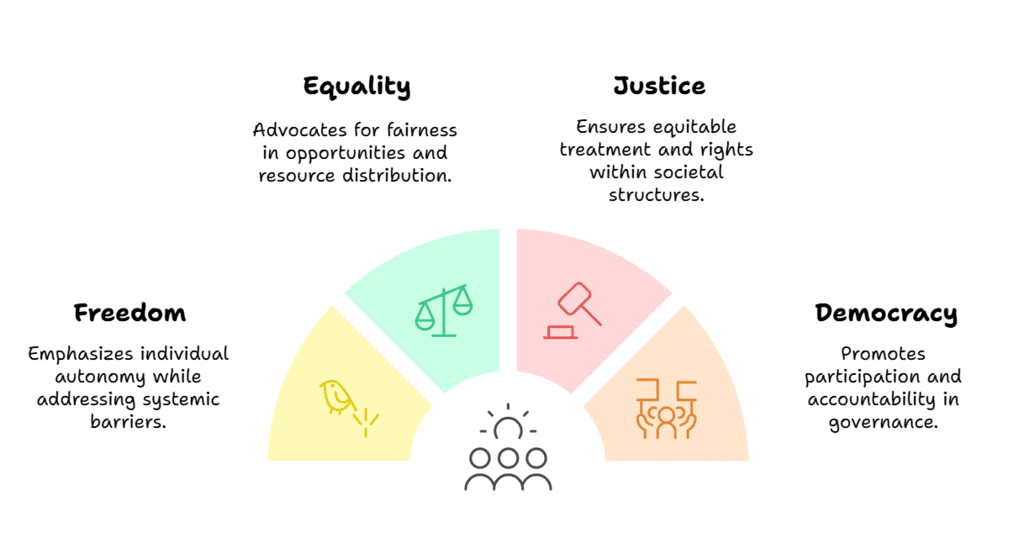Humanities/Arts Exam > Humanities/Arts Notes > Political Science Class 11 > Revision Notes: Political Theory : An Introduction
Revision Notes: Political Theory : An Introduction | Political Science Class 11 - Humanities/Arts PDF Download
Overview
The chapter discusses Political Theory, emphasizing its role in understanding key political concepts, principles, and institutions. Political theory addresses questions about the organization of society, the role of governments, and the values that shape political life, such as freedom, equality, and justice. It also explores the historical evolution of these ideas and their relevance in contemporary times, helping citizens engage meaningfully with political events and societal issues.
Facts That Matter
What is Politics?
- Politics refers to the collective decision-making processes in a society and the organization of power and governance.
- It involves not only government functions but also societal negotiations to address diverse needs and interests.
- Politics can be seen both as a pursuit of public good and as a field associated with manipulation and self-interest.

Scope of Political Theory
- Political theory examines and clarifies key concepts like freedom, equality, justice, democracy, and secularism.
- It analyzes the contributions of thinkers like Plato, Aristotle, Rousseau, Marx, Gandhi, and Ambedkar.
- It connects historical debates to contemporary political institutions and policies, enabling a better understanding of societal organization.
Why Study Political Theory?
- Helps citizens understand political systems, rights, and responsibilities.
- Encourages critical thinking about political and social issues, fostering informed participation in democracy.
- Enables systematic evaluation of political concepts and their implementation in real-life situations.
Key Values and Principles
- Freedom: Recognizes individual autonomy while addressing constraints like discrimination or systemic barriers.
- Equality: Goes beyond political equality to include economic and social dimensions, advocating fairness in opportunities and resource distribution.
- Justice: Balances fairness with societal structures to ensure equitable treatment and rights for all.
- Democracy: Encourages participation, representation, and accountability in governance.

Practical Relevance
- Political theory is not confined to academics but extends to policy-making, law, activism, and everyday life.
- It provides frameworks for addressing challenges like discrimination, inequality, and new dimensions of freedom in a globalized, technological world.
Words That Matter
- Political Theory: The study of ideas and principles shaping political systems, governance, and societal organization.
- Equality: Fair treatment and opportunities for all, irrespective of social, economic, or political status.
- Freedom: The ability to act without unnecessary constraints while respecting the rights of others.
- Justice: Ensuring fairness in laws, policies, and societal practices.
- Secularism: Separation of religion from political authority, ensuring equal treatment of all religions.
- Rule of Law: The principle that all individuals and institutions are subject to the same laws.
The document Revision Notes: Political Theory : An Introduction | Political Science Class 11 - Humanities/Arts is a part of the Humanities/Arts Course Political Science Class 11.
All you need of Humanities/Arts at this link: Humanities/Arts
|
43 videos|268 docs|39 tests
|
FAQs on Revision Notes: Political Theory : An Introduction - Political Science Class 11 - Humanities/Arts
| 1. What is political theory? |  |
Ans. Political theory is a branch of social science that aims to study the principles, concepts, and ideas behind political systems, governments, and political behavior. It seeks to understand and analyze various political ideologies, such as liberalism, socialism, conservatism, and feminism, and their implications for society.
| 2. What are the main areas of study in political theory? |  |
Ans. The main areas of study in political theory include the examination of different political ideologies, the analysis of power and authority, the study of democracy and its variations, the exploration of justice and equality, and the understanding of political institutions and processes.
| 3. How does political theory relate to other disciplines such as sociology and philosophy? |  |
Ans. Political theory overlaps with disciplines such as sociology and philosophy. It draws on sociological concepts to analyze the impact of political systems on society and individuals. It also engages with philosophical ideas to explore questions of ethics, morality, and the nature of political power.
| 4. What are some prominent political theories and thinkers? |  |
Ans. Some prominent political theories include liberalism, socialism, conservatism, and feminism. Notable political thinkers include John Locke, Karl Marx, John Stuart Mill, and Mary Wollstonecraft. These theories and thinkers have greatly influenced political thought and shaped the development of societies.
| 5. How does political theory contribute to understanding contemporary political issues? |  |
Ans. Political theory provides a framework for analyzing and understanding contemporary political issues. It helps to identify underlying principles, values, and ideologies that shape political debates. By examining historical and theoretical perspectives, political theory allows for a deeper understanding of current political events and challenges.
Related Searches





















